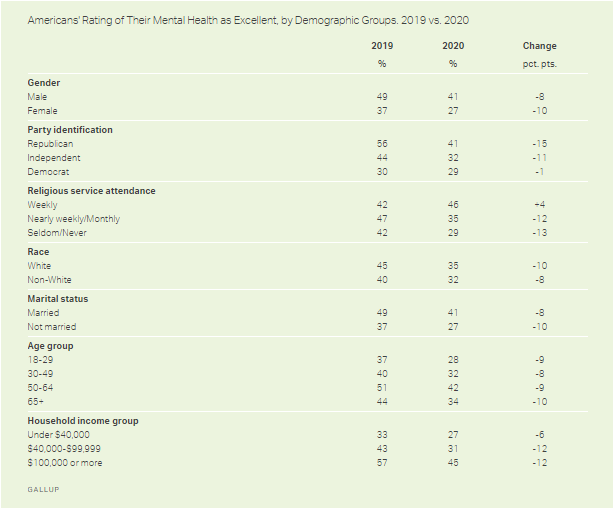
Guest Post by Stephanie from Rising River Marketing
There’s no denying that we’re experiencing a mental health crisis around the world right now. We hear it talked about on the news. We see posts about it on social media. But more importantly, we’re seeing it in our own lives and the people around us. And while there are a lot of great messages on mental health getting out there right now, I think many of them are missing an important piece of the puzzle.
As a mental health copywriter and ghostwriter, I work with a variety of mental health professionals. I spend a good portion of my day researching and writing about a wide range of mental health topics. And I can assure you that the messages you’re hearing about the levels of anxiety and depression increasing in the world are true.
The therapists I work with are busy in their offices or doing online therapy for twelve-hour days at times. They’re using small breaks between clients to squeeze in administrative tasks or a quick bite to eat. But these professionals are kind, caring, and compassionate, and they want to be able to help everyone they can.
And a lot of people need help right now.
Anyone can struggle with their mental health
When people think of “mental health”, there is often a stigma that comes with it. You may have a tendency to think about those serious mental health disorders that are often poorly and scarily portrayed in media, like movies and television shows. Some people think that the “mental health” conversation is for others—such as those with “serious issues”.
But I’ll let you in on a not-so-secret secret…everyone has “mental health”. While many associate the term with disorders, it’s simply our emotional, psychological, and social well-being, which are things so many people are struggling with right now. And rightly so. We’ve been bombarded for a year with fear and anxiety around the pandemic and growing hate and division between people.
It’s hard not to feel anxious, exhausted, overwhelmed, angry, sad, fatigued, and a million other things right now. After all, we’re human. We’re emotional creatures. We’re not robots designed to calculate the answers to the challenges life throws our way. It just doesn’t work like that.
So anxiety and depression increase when life gets hard.
In the past year alone, I’ve been hit with the following things in life:
- The pandemic
- Having a family member intubated in the hospital with COVID
- Losing a family member to cancer when she was denied possibly life-saving treatment because the state didn’t allow it at that time because of COVID
- Sitting with my girls on the couch listening to helicopters circle our neighborhood because protesters had shut down the roads and taken over the street
- Moving out of state
- Having a family member struggle with suicidal thoughts
- Caring for a grandmother struggling with the aftereffects of a stroke and other health concerns
- Listening to family and friends on opposite ends of the political spectrum tries to influence my thoughts and opinions
- Anxiety around sharing my beliefs and opinions for fear that cancel culture will take me out
- And too many other health challenges in my extended family to even count
And these are just a few of the things that happened. Even now, as I type this out, I can feel my heart start to beat faster. I can feel my breathing turn shallow. The symptoms of anxiety are real and they can kick in whether you want them to or not. And I realize that there are many who have faced and are facing more difficult situations than me. Please know that I don’t think my story trumps your story at all.
I’m guessing that you could probably create a long list like this. Your list might include a lost job, financial instability, loss of a relationship or loved one, abuse, or any other traumatic situation.
Life has not been easy for many people over the past year.
So where do we go from here?
Let’s be honest. Life has sucked in a lot of ways over the past year. And for most of us, it’s not like last year was the first time we started facing challenges. It just added to the top of the pile. And you may feel like you finally got the straw that broke the camel’s back.
So what now?
There are tons of great messages that exist to help you learn to handle anxiety and depression in a healthy way. In fact, Mike’s website and YouTube channel are jam-packed full of valuable tips and strategies you can use. There are also many therapists out there who are passionate about helping people learn how to overcome life’s challenges in a healthy way.
I encourage you to explore these options. I fully believe in the benefit of therapy. It’s something that I’ve personally experienced in my own life. And I’ll be forever grateful for the psychologist who worked with me. I also believe wholeheartedly that there are times when medication can play an important part in a treatment plan for overcoming mental health challenges.
Self-care is another important part of living a healthy life. There are many great resources available to help you learn how to create a self-care routine for yourself. This can help you learn strategies to get control of things like anxiety and depression. Don’t underestimate the benefits that these activities can have in your life.
But I also want to ask you to consider something else.
Therapy, self-care, and medication can play an important part in feeling better and addressing mental health. But I think most of the messages that are out there that address mental health leave out something important. Something that I believe people are desperate for right now whether they know it or not—God.
If you immediately thought something like “UGH!” or wanted to dismiss my message, I ask that you hear me out even if you don’t agree with me in the end.
I believe that many churches have done a poor job of caring for people struggling with mental health challenges. They throw out messages like “Pray harder”, “Have more faith”, or “Confess your sin in order to be healed.” These messages are hurtful and misleading.
Mental health challenges and disorders are real. I believe 100% in the benefit of therapy and medication when needed. I think there are people who really need the care that psychologists and psychiatrists are able to offer, and I’m thankful for the work they do. While I think it can be helpful to meet with a pastor or church leader, it’s not the same as meeting with a licensed mental health professional.
But I also believe there are many people who are struggling with anxiety and depression in the world right now because they have nowhere to place their hope. 2020 knocked things out of their control and they don’t know how to process it. And no amount of self-care is going to make it all better.
A surprising statistic
At the end of 2020, Gallup conducted a poll that found “Americans’ latest assessment of their mental health is worse than it has been at any point in the last two decades.” That probably doesn’t surprise you at all. I mean, c’mon…look at what 2020 threw at us.
However, the poll showed a decline in demographic groups split up between age groups, income groups, race, political party, gender, and religious service attendance. The only group that had a positive change in their mental health from the end of 2019 to 2020 is those who attended religious services weekly.
That’s it. Skin color didn’t matter. The political party didn’t matter. Marital status didn’t matter. Age didn’t matter. And household income didn’t matter. Across the board, all of those groups saw a decline.
The only group that felt their mental health improved were those who were engaging weekly through religious services.
Let that sink in for a minute.

We’re a society that has spent the past year all about “the science”, statistics, and demanding proof. Well, the statistics show that people who regularly attend religious services are mentally doing better than those who don’t.
What’s behind that statistic?
Let me be clear for a minute. I’m not a scientist. I’m not a statistician. And I’m not a mental health expert. In fact, I’m not even a “religious expert”. I’m simply a woman who has experienced first-hand the difference that God has made in my own life at my lowest points and in my own mental health. So I’m speaking from personal experience here.
These are some of the reasons I believe are behind that statistic.
Church provides community
We aren’t meant to do life alone. But because of the pandemic and the restrictions, so many people spent 2020 more alone than they’ve ever been before. And many are struggling now because of it.
On top of the pandemic, things like anxiety and depression can cause people to want to pull away from others. I’ve been there before. You may feel like a burden to other people. Or it may feel overwhelming to be around others. It just feels easier not to make the effort to talk to others or listen to how great their life is when you feel like your life is falling apart. I get it.
But having a support circle is so important for our mental health. This could be having trusted family and friends who you can talk to. And it can be having a church community that will rally around you in your current situation.
The first time I went back to church when the doors opened again, I fought back tears. There is just something about gathering together with other Christians and being in a room full of those who share my beliefs that touch my heart.
Forgiveness matters
Bitterness, anger, and resentment can have a real impact on your mental health. The Bible teaches about the power of forgiveness and grace. Society hasn’t been really big on forgiveness or grace in the past year.
I believe that there are two ways forgiveness impacts us. First is our ability to forgive others and second is our ability to receive forgiveness.
If people have hurt you and you refuse to forgive them, bitterness and resentment can easily take over your life. And if you’ve done things in your past that you feel bad about and don’t believe you’ve been forgiven, it can feel more difficult to extend forgiveness to others. It also becomes easy to get stuck in feelings of guilt and shame.
Holding on to unforgiveness can damage every area of your life including your health. But from my personal experience, when you learn how to receive forgiveness from God for the things you’ve done in your life, it puts you on a path that changes everything.
When you can see and acknowledge that you’re not perfect and you do things wrong and need forgiveness as well, it also makes it a little easier to stop judging others so harshly. And when you learn how to forgive and let go of bitterness and hate, it removes weight from your life that you were never meant to carry.
Comfort is available
One of the Bible verses that has been close to my heart for the past decade is this:
“Praise be to the God and Father of our Lord Jesus Christ, the Father of Compassion and the God of all comfort, who comforts us in all our troubles so that we can comfort those in any trouble with the comfort we ourselves have received from God.” – 2 Corinthians 1: 3-4
I know that might sound like a mouthful, but here’s what it all boils down to for me: God is compassionate and provides comfort when we’re going through trouble and difficulty. When you experience that comfort in the midst of a difficult situation, it’s like something you’ve never experienced before.
I drew comfort from that verse for years when I was walking through my most challenging times in life thus far. When I felt all alone in the world, that verse gave me strength.
But it goes one step further. The verse says that once we’ve experienced that comfort, we can help others to experience it as well. That’s what the church can help with. Over the past year, people have needed comfort maybe more than ever in our lifetime, for so many reasons. And it’s available for free from God. In addition, if you find a church that operates based on the Bible, they’re most likely working to try to help provide this comfort to people as well.
Faith provides us with hope for something bigger
Last year, my aunt died from cancer. As many of you have probably experienced before, it was a painful process to have to witness. But she left me with an incredible gift that I hope I can pass on to you.
As we were texting about all of the chaos that was happening in our country and the world, my aunt said, “I wonder how people cope without a close relationship with Jesus?”
You see, as the cancer spread, her faith in God grew stronger and stronger. At a time when some people would become bitter and angry because of a situation that was unfair and out of their control, she grew peaceful.
And I think now that we are almost a year from that conversation, I can look around at the world and say that I believe many people aren’t necessarily coping very well. And it’s not just Covid, politics, and racial tension. It’s life.
Life is hard. And if you’re putting your hope in your finances, job, health, relationships, or anything else in this world, you’re going to be disappointed and frustrated in the end. Because it all fades away.
As cancer spread in my aunt’s body and took more and more from her, she became an even incredibly strong woman of faith. When she knew that all the things of life were fading away and out of her touch, she started to focus on and speak more and more about the one thing that really makes a difference in the end—the one true God. And that’s something I’ll never forget, and I hope that her example has an impact on you as well.
For all of you against the “church” and Christians
If you’ve been hurt by the “church” or Christians in your life, I’m so sorry. I have been on that side as well and I know how awful that can feel. There is no excuse for that. But I want to invite you to think about and look at God and His word apart from the pain that people may have caused you.
Churches are full of imperfect people. Some are trying to give the impression that they’ve got it all together, but the truth is, that believing in God doesn’t necessarily change the difficult situations in your life. And it doesn’t mean you all of a sudden do everything “right”. It doesn’t mean that you will never experience negative things either.
But a true relationship with God and real faith will change your perspective on the world and everything that happens within it. It provides you with the opportunity to experience a peace that you can’t find anywhere else.
And this is why I believe God is the most important thing missing from the mental health conversation. If you’re feeling skeptical right now, my question to you is, “What do you have to lose?” If you’re struggling right now and the things that you’re trying aren’t helping, what’s stopping you from seeing if this is the thing that can make a difference for you? My favorite thing about God is that He meets you right where you are—right in the middle of all the mess.
Your next steps
If you’ve stuck with me this far—THANK YOU! I know that not everyone reading this will agree with this and that’s okay.
I just see so many people hurting, angry, and going after all the wrong things in life trying to fill that void in their life and I can’t stay quiet. When you experience something that changes your life in every single way, you want others to be able to experience the same.
So, if you’re struggling with your mental health right now, I encourage you to try the following:
- Talk to a therapist and explore your treatment options.
- Don’t push friends and family away (even if you have to explain that you don’t want to talk, you just want to be near them).
- Try out the self-care resources available on Mike’s website. Self-care really does make a difference for your mental health and emotional wellness.
- Check out this YouTube playlist. The church I attend recently did a series on mental health and it was so good. There were some powerful stories shared.
Most importantly, take care of yourself. Don’t neglect your health—physical, mental, emotional, or spiritual. And remember that you are not alone.
If you have questions about anything in this article, please feel free to reach out to me personally. Mike has graciously shared his platform with me, but the opinions and beliefs in this post are my own. If you want to chat about anything you read here or you just feel you need to respond in one way or another, I welcome your thoughts.
Stephanie Kirby is the owner of Rising River Marketing and content director for Mike Veny, Inc. Her passion for writing and wanting to help people led her to the mental health space where she loves to see the message of mental health and emotional wellness continue to spread.


